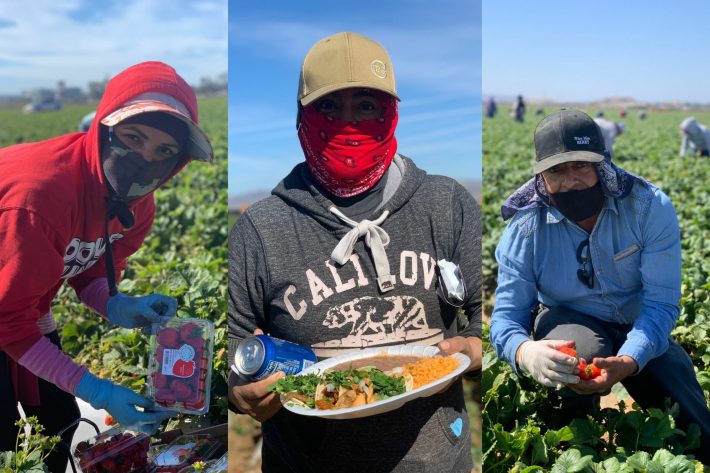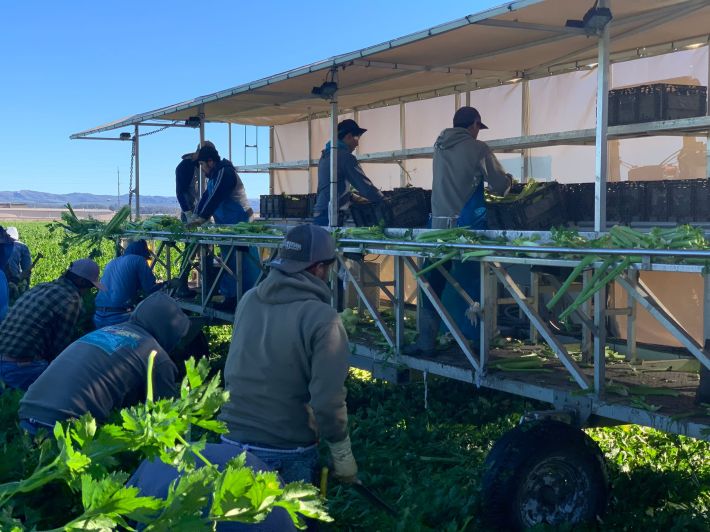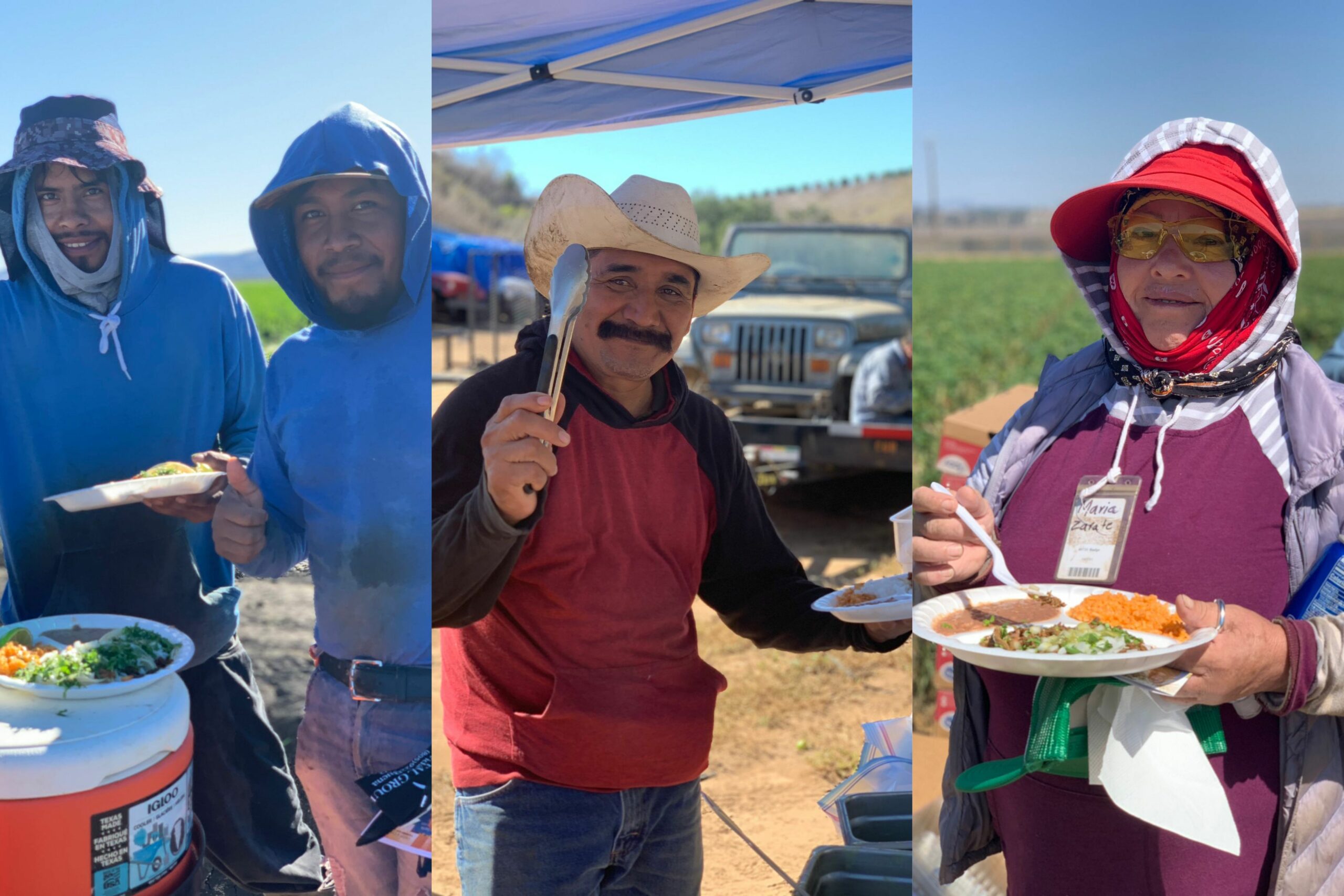Throughout the year, for the past seven years, these two Santa Maria residents have come together to give back to their community through food.
Gerardo “Lalo” Silva, also known as radio personality “El Texano” on La Ley 100.3 FM, has joined Misael Alvarez, co-owner of Efren’s Mexican Restaurant, to give back to California’s essential farmworkers by providing them with hot and delicious Mexican lunches from Efren’s restaurant.
The reason for giving back? They both once worked in the campo (field).
Coming from Durango, Mexico, a young 13-year-old Silva got his first job as a farmworker, working alongside his mother, picking vine-ripened chiles, onions, and walnuts. Now at 40, he said memories of the hard work and hardships they faced during those times pushed him to create these giveaways that solely benefit farmworkers five to six times a month.
“Siempre le tube mucho cariño y respeto a la gente del campo, (I’ve always had a lot of affection and respect for farmworkers,) I still remember my mother working long hours in the field while fully pregnant,” he tells L.A TACO over the phone. “Which is why I say what we do may not be much, but it doesn’t cost us anything being able to give them a good taco and leave them with a smile on their face. It’s priceless.”
Alvarez and his older brother Efren also remember their time in el campo. They both worked in the field picking grapes when they first arrived in Santa Maria from Michoacán. Alvarez said his brother taught him how to work in the fields, and it wasn’t until Efren was able to open up his brick and mortar restaurant that both were able to leave the campo. Now they have four restaurants, with Alvarez managing his own in Santa Maria.
Naturally, when Silva approached Alvarez in 2014 with the idea to give away meals, he automatically said yes. And these meals are not pre-packaged, oh no, Alvarez said they take everything to the campo and cook for them on sight. Like a giant carne asada for campesinos, providing them food like tacos, burritos and tortas estilo Michoacán, along with beverages and a side of arroz y frijoles. On one occasion, they donated masks and took doctors and nurses from a local hospital who provided farmworkers with information on COVID19 and offered vaccines.
When asked how many farmworkers or fields they think they have been to serve, they said well over 50 farmworkers and a variety of different fields, from avocado fields, strawberry, and raspberry fields to celery fields and more.
“I know how difficult it is. It’s really our pleasure to be able to do this,” Alvarez said in Spanish. “Y la gente es muy agradecida, (and the people are very thankful), and they love the food, and we hope to continue to do this as much as we can.”


For the two former farmworkers, going back to the fields is also a reminder of where they started before becoming a radio personality and managing his own restaurant in Alvarez’s case.
“I know from experience que es una lucha constante (that it’s a constant struggle,) a lot of them work so hard to make sure we have our fruits and vegetables in our table but when they get home they sometimes don’t have the food that they themselves work,” Silva said.
And he’s right. Farmworkers face numerous chemical and physical threats to their health when working long hours in the field, and many are food insecure. A study conducted in California’s Central Valley found that 45% of farmworkers had poor food security, 29% in Salinas Valley, and up to 80% for farmworkers living near the Mexican-US border reported food insecurity. A sad reality has prompted non-profits like Celebration Nation and No Us Without You to create food programs that benefit farmworkers and undocumented immigrants in the US.
“Many don’t have any idea of how much work goes on in the field, sometimes we work 10 to 12 hours in the rain, in the cold, and the same in the summer, hours in the sun,” Salvador Reyes, a farmworker in Santa Maria explained in Spanish. “And it is not always paid well, now they want to equal the salary, but even right now it is about $15.50 to $16.25, but the minimum is $14.50.”
“Gracias a ellos (thanks to them). Thanks to their non-stop work before and during the pandemic, we had food in stores, in our restaurants, and at our tables. I hope they know that their work is valuable and appreciated by all of us. This country would not function without their hard work.”
The 51-year-old from Jalisco has been working different jobs in the fields for the past 25 years. He said in those years. HetoThese organizations have created as picked cabbage, broccoli, cauliflower, lemons and said he has also worked the machinery in the farms. But he explained that the most laborious job is picking produce, a demanding position on the body and mind. So when efforts such as the one Alvarez and Silva provide come to them, they are delighted.
“Es un lujo para nosotros (it's a luxury for us). We’ve won for the past three years. Besides the delicious food, we appreciate it because they recognize our hard work, and they acknowledge us and treat us with so much respect,” said Reyes during his short break from work. “Pero yo estoy muy orgulloso de ser campesino (but I'm very proud to be a farmworker), because there’s always work, pandemics, fires in the country come and go but mother earth keeps producing and we’re here to work the land.”
For Silva and Alvarez, the season for giving is all year round. Although farmworkers are one of the main groups they give back to, they have provided lunches to firefighters during fire season, hospitals, and local businesses.
“We all come to this country with the same goal, to work and help out our community, and that’s what we’re trying to do here,” Silva said. “I’ve been around farmworkers for a long time, and they deserve so much more than what they get. They deserve better pay, better conditions, and if possible to be given the opportunity at getting their papers.”
As for Alvarez, he said he simply wants to thank all farmworkers.
“Gracias a ellos (thanks to them). Thanks to their non-stop work before and during the pandemic, we had food in stores, in our restaurants, and at our tables. I hope they know that their work is valuable and appreciated by all of us. This country would not function without their hard work.”






